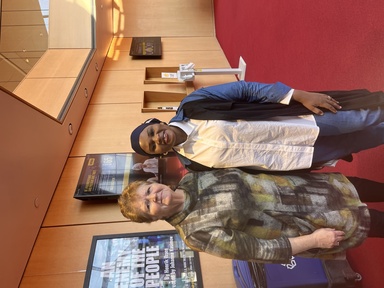
This spring, we welcomed—and recently bid a regretful farewell to—Rasheedah Liman, director, playwright, and Professor of Theatre and Performing Arts at Ahmadu Bello University in Nigeria. Radiating enthusiasm from the moment she arrived, Rasheedah immersed herself in the UI theatre community and in discussions with faculty across the university.
Liman is a scholar and practitioner of eco-theatre, a theatrical form that, in her words, "recognizes the potential of theatre to contribute to environmental consciousness, with the goal of harnessing the transformative power of the stage to engage audiences, evoke emotional responses, and promote environmental awareness." Artists and cultural practitioners, she says, are increasingly exploring ways to incorporate sustainability and environmental consciousness into their creative processes. Stage directors, for instance, may use eco-friendly production practices, such as sustainable set design, responsible material use, and energy-efficient technology use. Directors may collaborate with other artists to develop narratives that address environmental issues, provoke thought, and inspire audiences to reevaluate their relationship with the environment.

During her seven weeks as an Obermann International Fellow, Liman discussed theatre research and techniques with faculty in the Department of Theatre Arts, guest lectured in UI theatre and community engagement courses, participated in the Iowa New Play Festival, joined in script-reading and post-play reading sessions—including for Adaku, written by Nigerian playwright and UI MFA candidate Sixtus Chetachi Igbokwe—attended numerous theatre and musical productions, met with colleagues from the School of Journalism & Mass Communication and African American Studies, and attended an advanced acting class taught by Paul Kalina. During the class, she says, "I got to see and feel various acting techniques that differ from those back home. The concepts of mask and masking really stood out to me. Paul Kalina is indeed a wonderful and dedicated teacher. We intend to establish research collaboration in the near future." She also credits Mary Beth Easley, DEO of Theatre Arts, for introducing her to the department's many beautiful production spaces, studios, workshops, and library.
Rasheedah made the most of her time off-campus, too, traveling to Pella for the Tulip Festival and to Chicago to see a large-scale theatrical production. "That experience was a first for me in the U.S.," she notes. "I saw and learned a lot, particularly in terms of stage design."
She reports that she's now sharing her Iowa experiences with colleagues and students at her home university in Nigeria, where she has several new works on or around eco-theatre already in progress.